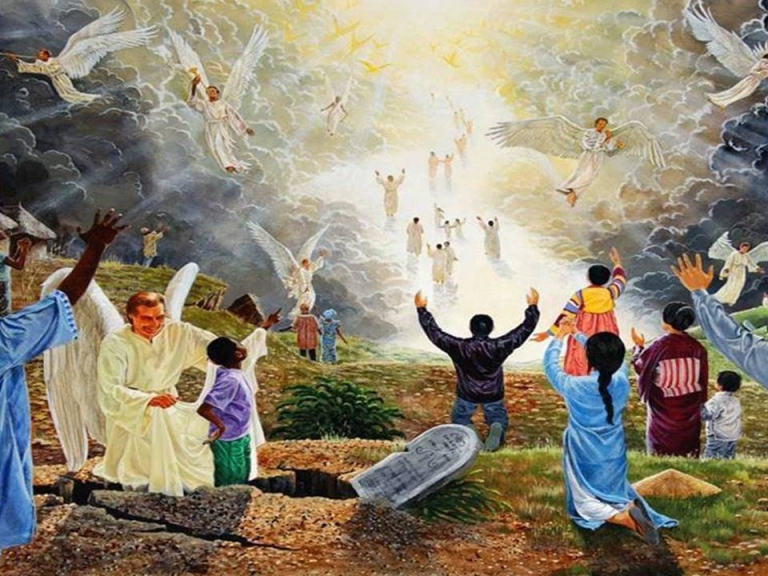Facing the Mystery of Death with Hope
Death is one of the greatest mysteries of human existence. Across cultures and religions, people have sought to answer the question: What happens when we die? For some, death brings fear of eternal torment in hell. For others, it’s the hope of an immediate transition to heaven. But what does the Bible—God’s Word—actually teach about life after death?
From a biblical worldview, death is not an instant gateway to eternal reward or punishment. Instead, the Bible consistently describes death as a sleep in the grave—a peaceful rest until the Second Coming of Jesus Christ, when all who have died will be awakened. This truth, far from being frightening, is filled with grace, hope, and faith.
In this blog post, we will explore what Scripture says about death, the difference between the first death and the second eternal death, and why understanding God’s loving plan for humanity brings comfort in times of grief.
Background: How the Bible Describes Death
The Origin of Death in Scripture
The story begins in the Garden of Eden. God created humanity in His image, giving Adam and Eve the gift of eternal life—on one condition: they were not to eat from the tree of the knowledge of good and evil (Genesis 2:16–17). When they disobeyed, sin entered the world, and with it, death (Romans 5:12).
From that moment, all human beings became subject to mortality. The Bible tells us, “For the wages of sin is death, but the gift of God is eternal life in Christ Jesus our Lord” (Romans 6:23). Death is not natural—it is the tragic result of sin.
Death as “Sleep” in the Bible
Throughout Scripture, death is described as sleep. Jesus Himself used this imagery when speaking of His friend Lazarus. In John 11:11–14, He told His disciples, “Our friend Lazarus has fallen asleep; but I am going there to wake him up.” The disciples misunderstood, thinking Lazarus was merely resting. Jesus clarified: “Lazarus is dead.”
This same metaphor appears repeatedly in the Old and New Testaments. For example:
- “David rested with his ancestors and was buried in the City of David.” (1 Kings 2:10)
- “For the Lord Himself will descend from heaven… and the dead in Christ will rise first.” (1 Thessalonians 4:16)
The Bible paints death as a temporary, unconscious state—like sleep—awaiting resurrection.
Main Arguments: Why the Bible Teaches Sleep in the Grave
- The Dead Know Nothing
Ecclesiastes 9:5 clearly states: “For the living know that they will die, but the dead know nothing; they have no further reward, and even their name is forgotten.” This passage removes any doubt—those who die are not aware, conscious, or active in heaven or hell. They are asleep.
- The Promise of Resurrection
If the dead were already in heaven or hell, why would the Bible emphasize a resurrection at the Second Coming of Jesus Christ? Jesus promised in John 5:28–29: “Do not marvel at this, for the hour is coming when all who are in the graves will hear His voice and come forth.”
The resurrection is central to the Christian faith. Paul writes in 1 Corinthians 15:16–18 that if there is no resurrection, then those who have died in Christ are “lost.” This shows that they are not yet in heaven—they are waiting in the grave until Christ’s return.
- Comfort in the Sleep of Death
Some fear the idea of death because they imagine immediate torment in hell. But Scripture reassures us: death is a rest, free from suffering, pain, and fear. Job 14:12 compares death to lying down and not waking until the heavens are no more—pointing forward to the resurrection at the Second Coming.
This truth is comforting. Our loved ones who have passed are not in pain. They are at peace, sleeping, awaiting the glorious day when Christ calls them back to life.
- The First Death vs. the Second Death
The Bible distinguishes between two types of death:
- The First Death: The temporary sleep that all humans experience as a result of sin. This is the death we see in cemeteries, hospitals, and obituaries. It is not permanent.
- The Second Eternal Death: Mentioned in Revelation 20:14–15 as the “lake of fire,” this death is the final destruction of the wicked—those who reject God’s gift of eternal life. Unlike the first death, the second death is eternal and irreversible.
This understanding highlights God’s grace and justice. The wicked are not endlessly tormented in hell; instead, they are mercifully put to an eternal rest, never to suffer again.
Practical Applications: Living with Hope and Faith
- Finding Peace in Grief
When we lose someone we love, grief is natural. Yet, the biblical worldview of death as sleep offers hope. We do not have to wonder if they are watching us from heaven or burning in hell. Instead, we can rest in the promise that they are sleeping peacefully, waiting to rise when Jesus returns.
- Deepening Our Faith in Christ
Understanding death correctly strengthens our faith. The Bible teaches that salvation is not about escaping immediate hellfire or rushing to heaven, but about trusting in Jesus’ sacrifice and waiting in hope for His return. When we place our faith in Christ, we can face death without fear.
- Living with Eternity in Mind
Knowing that death is temporary motivates us to live faithfully today. Life on earth is short, but God has promised eternal life through grace. Our choices matter. By surrendering to Christ now, we secure the gift of resurrection to eternal life.
- Sharing Comfort with Others
Many people struggle with the fear of hell or the confusion of what happens after death. By gently sharing the truth of Scripture—that death is sleep until the resurrection—we can bring comfort and clarity to hurting hearts.
Common Misunderstandings and Clarifications
“Don’t People Go Straight to Heaven?”
A common belief is that when someone dies, their soul immediately goes to heaven. However, as we’ve seen, the Bible emphasizes resurrection at the Second Coming, not an instant transition. Even the righteous heroes of faith—David, Moses, and others—are described as resting in the grave. Acts 2:34 states clearly: “David did not ascend into the heavens.”
“What About Hell?”
Hell is often misunderstood as a place of eternal torment. But Scripture teaches that the wicked will face the second death in the lake of fire (Revelation 20:14). They will not burn forever but will be completely destroyed—an act of mercy from a God of love.
“Is the Soul Immortal?”
The Bible never says the soul is inherently immortal. Immortality is a gift that God bestows only on the saved at the resurrection (1 Corinthians 15:53–54). The soul that sins will die (Ezekiel 18:4).
Practical Tips for Living in Light of the Truth About Death
- Study Scripture Regularly: Anchor your understanding in God’s Word. Focus on passages about resurrection, eternal life, and the return of Jesus.
- Pray for Peace: Ask God to fill your heart with faith and comfort when facing death, whether personally or in grief for others.
- Encourage Others with Hope: Share the biblical truth about death lovingly, especially with those who fear hell or worry about their loved ones.
- Prepare Spiritually Each Day: Live with eternity in mind. Seek a close relationship with Jesus now, so you will be ready for the resurrection when He returns.
- Trust in God’s Grace: Remember that eternal life is not earned but received through grace by faith in Jesus Christ.
Conclusion: Hope Beyond the Grave
Death is not the end. From a biblical worldview, death is a temporary sleep in the grave until the Second Coming of Jesus Christ. The Bible assures us that the dead know nothing, that they rest in peace, and that one day soon they will hear the voice of Christ calling them to rise.
The first death is temporary, a natural result of sin, but not to be feared. The second eternal death is the final destruction of evil, a merciful end to sin forever. Between these two realities stands the greatest hope of all: the resurrection to eternal life through grace and faith in Jesus.
God’s love is greater than fear, and His promises are sure. When we understand death through the lens of Scripture, we can face life’s greatest mystery with peace, knowing that the story does not end in the grave. The next conscious moment for those who sleep in Christ will be the joy of seeing Him face to face, in a new heaven and a new earth, free from pain, sorrow, and death forever.
“And God will wipe away every tear from their eyes; there shall be no more death, nor sorrow, nor crying; and there shall be no more pain, for the former things have passed away.” (Revelation 21:4)






